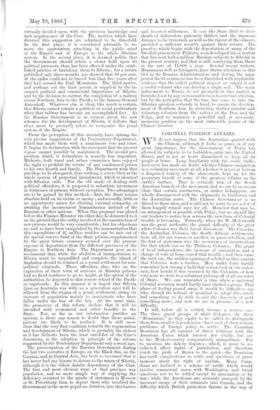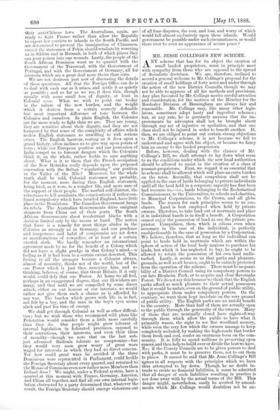COLONIAL FOREIGN AFFAIRS.
WE do not suppose that the Australian quarrel with the Chinese, although it looks so grave, is of any- great importance, for the Government of Pekin has
allowed its subjects to be forbidden entry into the United States, and is not at heart disinclined to keep all its people at home. Long familiarity with the coolie traffic, moreover, has made us doubt whether Chinese emigration is a voluntary movement at all, whether it is not at bottom a disguised variety of the slave-trade, kept up for the pecuniary benefit of some of the greatest villains on the earth's surface. That is certainly true of the South American branch of the movement, and we are by no means clear that certain contractors, or rather kidnappers, are wholly disconnected with the shipments to California and
the Australian ports. The Chinese Government is no friend to these men, and would not be sorry to see a few of
them happily ruined once for all. However that may be,
an arrangement is possible with Pekin ; but we should like our readers to notice how serious the new form of Colonial trouble is becoming. Formerly, when Sir W. Molesworth was the great authority, the grand difficulty of the great white Colonies was their latent discontent. The Canadas, the Australian Colonies, the South African settlements, were all, for one reason or another, in quasi-rebellion, and the fear of statesmen was the recurrence of insurrections like that which cost us the Thirteen Colonies. The grant of local independence, the increase of emigration, and a change of tone at home cured that trouble ; and then came the next one, the sudden uprisinc,° of a belief in this country that Colonies were a burden. Men under forty hardly remember how strong a hold that notion took of our states- men, how keenly it was resented by the Colonists, or how very near we were to a voluntary putting-off of all our robes of State. We can remember a time when a universal Colonial secession would hardly have elicited a groan. That phase of feeling passed away, it would be difficult to say why, though the refusal of mankind to adopt Free-trade had something to do with it, and the discovery of gold something more ; and now we are in presence of a new difficulty.
It will, before all is settled, become a serious one. The three grand groups of white Colonies—the three "Dominions," as they ought to be called, to distinguish them from smaller dependencies—have each of them serious problems of foreign policy to settle. The Canadian Dominion has all manner of direct relations with the American Union which interest her vitally, but are to the Mother-country comparatively unimportant. Not to mention the fishery disputes—which, it must be re- collected, affect rights of jurisdiction, and therefore touch the pride of States to the quick—the Dominion has tariff complications to settle, and questions of grave moment about the right of asylum. Many Cana- dians are inclined to a scheme of tariffs which would involve commercial union with Washington, and breed questions not to be settled except by annexation or by war; while the Americans are seriously annoyed by the incessant escape of their criminals into Canada, and the difficulty which British protection throws in the way of Their anti-Chinese laws. The Australians, again, are ready to fight France rather than allow the Republic to export her convicts to islands in the South Pacific, and are determined to prevent the immigration of Chinamen, even if the statesmen of Pekin should retaliate by worrying as in Sikkim and in Burmah, in both of which places they an pour poison into our wounds. Lastly, the people of the South African Dominion want us to quarrel with the Government of the Transvaal, with the Government of Portugal, and with the Government of Germany, all for interests which are a great deal more theirs than ours. We are not desirous just now of discussing the details of these questions. All that the Foreign Office can do is to deal with each one as it arises, and settle it as quietly :as possible ; and so far as we see, it does this, though usually with some small loss of dignity, at least in Colonial eyes. What we wish to point out to-day is the nature of the new burden, and the weight ,which it derives from a certain scarcely definable but most important difference of tone between the Colonies and ourselves. In plain English, the Colonies are far more ready to fight than we are. They are young, they are sensitive about their dignity, and they are not hampered by that sense of the complexity of affairs which makes English statesmen so unwilling to risk serious 'crises. The English hauteur, resting as it does upon a grand history, often inclines us to give way upon points of form ; while our European position and our possession of India compel us to forecast dangers which the Colonists think it, on the whole, rather feeble to care anything about. What is it to them that the French occupation -of the New Hebrides really depends upon the proposed ,convention with the Sultan "regularising" our position in the Valley of the Nile ? Moreover, for the whole truth shall be told, Colonial statesmen are probably, for the moment, more daring than English statesmen, being bred, as it were, to a rougher life, and more sure of the support of their people. The morbid self-distrust, the -reluctance to kill assailants, the conscientious if rather con- lused scrupulosity which have invaded England, have little place in the Dominions. The Canadian Government hangs its rebels. The Australian Governments drive emigrant steamers from China out of their ports. The South African Governments shoot recalcitrant blacks with a decision limited only by the means at hand. The notion that force is a remedy for most things abides in the Colonies as strongly as in Germany, and our prudence and temperance and habit of compromise are set down as manifestations of cowardice, or at least of a certain -overfed sloth. We hardly remember an international agreement made by us for the benefit of a Colony which did not leave a slight grudge in that Colony's mind,—a feeling as if it had been to a certain extent deserted. This feeling is all the stronger because a Colonist always, almost of necessity, thinks not of the world, but of the one Power which is just then annoying him, and so thinking, believes, of course, that Great Britain, if it only would, could defy that one Power. At home we all feel, perhaps in an exaggerated degree, that our ill-wishers are many, and that until we are compelled by some direct attack, either on our honour or our interests, we would rather not give them such a chance as is afforded by any war. The burden which grows with life is, in fact, not felt by a boy, and the man in the boy's eyes seems slack and past his time of energy.
We shall get through Colonial as well as other difficul- ties; but we wish those who recommend wild plans like Federation would consider them a little more carefully than they do. Our people might grow tolerant of internal legislation in federated provinces, opposed to their convictions, their interests, and even their ideas of morality—though we note that on the last sub- ject advanced Radicals tolerate no compromise—but they would very soon grow weary of great wars waged for interests in which they -had no direct concern. Yet how could great wars be avoided if the three Dominions were represented in Parliament, could heckle the Foreign Secretary about every quarrel, and returned to the House of Commons even now rather more Members than Ireland does ? We might, under a Federal system, have a quarrel at this moment with France, Germany, America, and China all together,And find all our own internal legis- lation obstructed by a party determined that, whatever the result, the Foreign Secretary should emerge victorious out of all four disputes, the cost, and loss, and worry of which would fall almost exclusively upon these islands. Would government be possible under such circumstances, or would there ever be even an appearance of secure peace ?



































 Previous page
Previous page